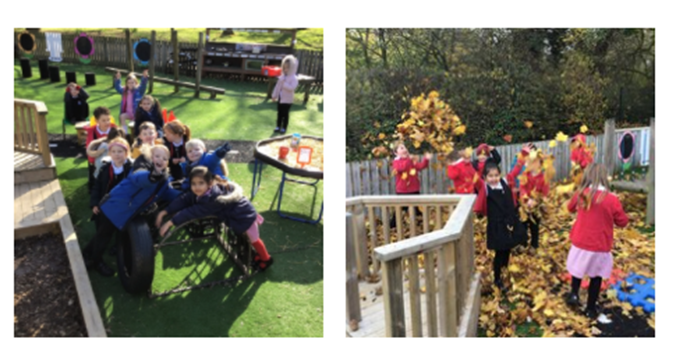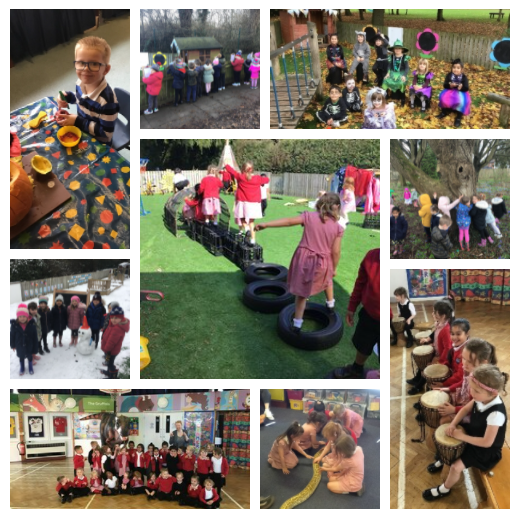



EYFS
EYFS Statement of Intent
Working in partnership with parents to encourage independent, happy learners who thrive in school and reach their full potential.

|
“Play builds the kind of free-and-easy, try-it-out, do-it-yourself character that our future needs.” – James L. Hymes, Jr. |
At Glenmere we strive to provide an educational journey that inspires and provides the stepping stones to grow and achieve. For children in Reception, the curriculum sets the scene for the full range of subjects that come later. Our curriculum in Early Years is designed to provide a broad, balanced and holistic start to education that meets the needs of all children, equipping them with the self-belief and cultural capital they need to succeed in life.
We celebrate diversity and facilitate pupils’ spiritual, moral, social and cultural development. Children with specific needs, including SEND and EAL are supported to ensure they reach their full potential. The intent of our EYFS curriculum is to set no limits on, or put up any barriers to the children’s achievements, regardless of their backgrounds, circumstances or needs. The high ambition it embodies is shared by all staff.

Our ethos in Early Years is to nurture our pupils’ personal, social and emotional development; providing the essential roots of safety, security and readiness to learn. We recognise strong, positive relationships are fundamental to supporting children’s cognitive development and place high value on our partnership with parents, carers and practitioners to enable our children to be happy and secure learners.

|
“No significant learning occurs without a significant relationship.” - James Comer |
Our curriculum and care practices promote and support children’s emotional security and development of their character. Staff teach children the language of feelings, helping them to appropriately develop their emotional literacy. Our staff give clear messages to children about why it is important to eat, drink, rest, exercise and be kind to each other. They teach children to take managed risks and challenges as they play and learn, supporting them to be active and develop physically.
Our staff create a learning environment that supports the intent of an ambitious, coherently planned and sequenced curriculum. Our resources are carefully chosen to meet the children’s needs and promote learning.
Our provision is purposeful, facilitating the growth of skills, knowledge and understanding, as well as celebrating and facilitating individuality; for each child is embarking on their own unique learning journey. We encompass each child’s individual starting points and plan to build the foundations to achieve their full potential. The classroom and outdoor areas of the early years provision are attractive and well resourced.
Through the 7 areas of learning in the Early Years Foundation Stage we provide topics that inspire and engage children, building on own interests and enthusing their experiences of the world. We recognise and celebrate that children in our setting have varied experiences. Our staff work hard to ensure our learning environment consistently promotes a wider knowledge and understanding of the world. Our teaching takes account of the equipment that adults provide and the attention given to the physical environment, as well as the structure and routines of the day that establish expectations. Together we work to provide ambitious expectations for all children from all backgrounds.
Integral to our teaching is how staff assess what children know, understand and can do, as well as taking account of their interests and dispositions to learn (characteristics of effective learning), and how staff use this information to plan children’s next steps in learning and to monitor their progress.
Implementation
At Glenmere we offer a curriculum which builds on the knowledge, understanding and skills of all children and their unique starting points. We follow the Early Years curriculum using topic themes and enrichment opportunities to facilitate secure foundations for learning. We value our pupils’ contributions, enabling opportunities for child-led interests to shape our curriculum.
The aim of our curriculum is to enthuse a love for learning by:
- Designing and implementing a curriculum that places child utcomes at the heart. Consistently working to deliver an effective curriculum that inspires, motivates and builds on prior knowledge. A curriculum that is responsive to children’s unique interests and stages in learning; promoting the best outcomes for all children.
- Carefully planning sequences f lessons that provide meaningful learning experiences, scaffolding and challenge.
- Teachers have high expectatins. They know what the pupils should learn and when in each of the 7 areas of learning so that children develop, consolidate and deepen their knowledge, understanding and skills across all the areas.
- Staff ensure that the cntent, sequencing and progression in the 7 areas of learning are secured, as appropriate.
- The cntent of the EYFS curriculum is taught in a logical progression, systematically and in a way that is explained effectively.
- Prviding an effective and engaging learning environment that enables all children to be resilient, capable, confident and self-assured. Purposeful provision that enables all children to access all areas of learning. Providing child-initiated opportunities through rainbow challenges, that enhance children’s learning and allow them to make connections and apply their learning independently.
- Prviding opportunities to build positive and trusting relationships with children. Planning for moments of high-quality interactions with adults; modelling communication, listening and expectations.
- Adults use purpseful and effective questioning to check understanding and address misconceptions. Promotion of an enabling environment through opportunities of in the moment feedback to facilitate and extend learning at the right moments in the learning environment. Adults are responsive to each child’s interests and needs.
- Children with special educatinal needs and/or disabilities SEND usually learn the same curriculum as their peers. Teachers sometimes adapt the curriculum if these children need to go back over previous learning.
- Planning fr careful assessments, through observations, which are recorded on Tapestry and shared with parents. These are used to inform the next steps of learning and meet individual needs.
- Prvision of rapid, individualised intervention to address gaps in learning.
- Prviding opportunities to build positive and trusting relationships with parents and carers through learning platforms (i.e. Tapestry and Class Dojo). Offering and ‘open door’ policy whereby parents can arrange for conversations to ask questions and discuss individualised support for learning at home.
- Suggesting hme learning opportunities with information about what has been taught, allowing parents to build on their child’s school experiences, at home. including details abut the school’s method of teaching reading and how to help their children learn to read.
- Sending hme a weekly class outline to parents and inviting them to information sessions such as synthetic phonics and early maths. Signposting useful sources and resources to support key areas of learning.
- By the end f Reception, children have the personal, physical and social skills they need to succeed in the next stage of their education. Children are prepared well for Year 1. They have the knowledge and skills they need to benefit from what school has to offer when it is time to move on from Reception, thanks to approaches including fast four, linked learning, road maps, and rainbow challenges.
- By the end of Reception, children achieve well, including those children with lower starting points.
Impact
Children demonstrate high levels of engagement in activities, developing their speaking and listening skills, enabling them to access more areas of the learning. Children have a wider sense of the world around them and can draw on these experiences during interactions with others and link this to new learning. Children demonstrate their positive attitudes to learning through high levels of curiosity, concentration and enjoyment. They listen intently and respond positively to adults and each other. Children are developing their resilience to setbacks and take pride in their achievements.
Children are beginning to manage their own feelings and behaviour, understanding how these have an impact on others. They are developing a sense of right from wrong. They demonstrate their attitudes and behaviours through the key characteristics of effective learning: playing and exploring, active learning, creative thinking and thinking critically.
Children develop their characteristics of effective learning and are able to apply their knowledge to a range of situations making links and explaining their ideas and understanding. Children develop skills across all areas of the curriculum, are confident to take risks and discuss their learning. Children are able to draw on their experiences to improve or adjust what they are doing.
From their different starting points, all children will make good progress academically, emotionally, creatively, socially and physically. Leaders look carefully at the impact that the quality of education has on children, particularly the most disadvantaged and those with SEND. Children’s learning and development over time is secure because the curriculum is effectively meeting children’s needs.
Knowledge, understanding and skills will be secured and embedded so that know and remember more, attain highly and are fully prepared for the next stage in Year 1.
English
In Reception, the children have a English whole class taught session 4 times a week and a daily Phonics session each morning. Each child receives two adult led English activities weekly.
At Glenmere, we use a systematic approach to the teaching of synthetic phonics to enable children to develop secure reading and spelling skills. It is proven that high quality phonics teaching is the best route for children to become fluent and independent readers. The teaching of phonics and early reading area priority. A well-organised phonics programme begins in the Reception Year. Teachers are well trained and follow the programme closely.
Through the teaching of phonics, children are taught the essential skills needed for reading. We use Rocket Phonics as a systematic synthetic phonics programme. All teaching and materials are used to support the teaching within these lessons. All pupils are provided with fully decodable books and these are introduced when all the grapheme phoneme correspondences have been taught. The phonics sounds are constantly revisited to embed over the year and there are a range of opportunities for children to apply their phonics knowledge through group activities and continuous provision. Teachers check carefully that pupils remember new sounds. They use this information to identify pupils who are not keeping up. Teachers give these pupils extra help for as long as they need it.
Staff further develop children’s communication and language through singing songs, nursery rhymes and playing games. Specific vocabulary for Reception children to acquire is planned and used. Children develop their vocabulary and understanding of language across the 7 areas of learning. Staff read to children in a way that excites and engages them, introducing new ideas, concepts and vocabulary.
In Reception we are passionate about promoting a life-long love for reading. Staff develop children’s love of reading through reading aloud and telling stories and rhymes. Teachers match reading books closely to the sounds pupils know. Once pupils know all of the sounds, they enjoy reading books they choose themselves. A secure a knowledge of phonics provides the foundations for future learning, especially in preparation for them to become confident and fluent readers. We use high quality texts as a basis for Literacy planning, carefully chosen to link with topics and promote reading for pleasure.
We use ‘Talk for Writing’ techniques to help develop the children’s literacy skills through the imitation of stories and use of actions. Alongside, we have regular shared read informed by ‘VIPERS Talk’, promoting children’s communication, listening and comprehension skills.
Maths
Children in the early years get off to a good start with maths. In Reception, the children have a Maths whole class taught session 5 times a week. Each child receives 3 adult led Maths activity weekly. Teachers follow the mathematics curriculum closely. They carefully explain new ideas to children and use practical resources help them understand what they are doing. Teachers checks identify when children may have gaps in their learning and need a reminder.
The maths curriculum is progressively taught using the ‘White Rose Maths’ scheme of learning. A highly visual number fact teaching programme developing a deep understanding of number, number relationships and fluency. Sessions are planned to promote early number sense using the four C’s: counting, comparison, cardinality and composition. This starts with mastering numbers 0-5 and then progresses through to 0-10. Most pupils can explain their mathematical thinking well. We want our children to become confident mathematicians who can problem solve and apply what they have learnt to real life experiences.
Staff ensure that children have sufficient practice to be confident in using and understanding numbers. The mathematics curriculum provides a strong basis for more complex learning later on.
Broader Curriculum
The foundations of all our broader curriculum subjects begin in the EYFS. In Reception the children have whole class weekly PE, PSHE, RE and Music lessons. Learning in Geography, History and RE are implemented through guided groupwork. Reception have three dedicated slots of physical education each week. We recognise physical activity is vital in children’s all-round development, enabling them to pursue happy, healthy and active lives. A specialist PE coach delivers high quality PE sessions. Opportunities for outdoor learning are planned across the year using onsite grounds and neighbouring facilities at Brocks Hill Country Park.
We expose our children to a broad selection of quality stories, nonfiction, rhymes and poems that foster an understanding of our culturally, socially, technologically and ecologically diverse world.
Our broader curriculum subjects are also delivered through, explicit quality teaching, whole school assemblies and planning opportunities in continuous provision.
Outside of whole class and guided group work, the children are engaged in ‘discovery time’ in our newly developed unit. Our continuous provision provides resources, questions and opportunities for self-directed learning and play that enables children to explore broader areas of the curriculum and build upon prior learning. The children can run away with their imagination, creativity and exploration of the world, through a wide range of media and materials.
We facilitate broader learning experiences through British values, Everyone’s Welcome and our personal growth. Planned opportunities for trips and visitors across the year enrich our children’s learning experiences. Our whole school values enable our children to foster respect, unity, positivity, hope, empathy and acceptance towards others. Children’s personal, social and emotional development is prioritised, so they feel safe and are secure, stimulated and happy.
Further information regarding teaching and learning in EYFS can be found on EYFS year group page.









